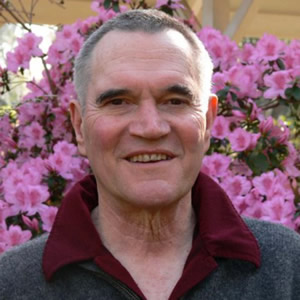Interview with Ted (Ed) Tripp
Podcast talk with Ted Tripp (2023) - go to podcast page for links to other venues to hear podcast Ted Tripp heard Shunryu Suzuki speak at Stanford in 1967 and met him the next year at Tassajara, where Suzuki let him stay longer in order for him to prepare himself to go to prison for anti-war activities. He's recently retired from teaching English at San Jose State and UC Santa Cruz. He says, "A solid foundation of dharma and ability to practice meditation is a good preparation for what comes next."
Ted (Ed) Tripp interviewed by DC August 31, 1995 This is Ted Tripp, known in those days as Ed Tripp. I went to Zen Center at Bush Street in early June of 1968. I knew that I was going to be arrested for the draft and I knew it would be important to know how to take care of my time inside of jail and so I very much wanted to learn how to meditate. And so I attended a sesshin at Bush Street and someone told me they needed people to help take care of the guests at Tassajara and would I like to go and so I left the next day. As soon as I arrived at Tassajara I had to sit a three day tangaryo [initiatory all day sitting], which was kind of rough since I'd just come out of a sesshin and at the end of the time we had to ask Suzuki Roshi if we could enter the monastery. We were led to Suzuki Roshi's cabin by the little garden and stood outside and went in one at a time. I bowed to the roshi and sat and asked if I could enter and he looked at me and shook his head and said, "No." I said, "Oh please Roshi, let me stay. I've got to go to jail because I'm refusing to go into the army and I've got to learn how to meditate. I've got to sit zazen." So he said, "Alright." I think he thought I was too young. I was 23 at the time. So I said, "Thank you very much," and I bowed standing and he bowed to me and I turned around and he hit me on the shoulder with the stick and I turned around and said, "What?" and he said, "Oh, nothing," and dismissed me and latter there was a formal entering ceremony (before evening service where we walked around the zendo with our hands in gasho and everyone bowed to us as we walked by). That was the most shocking face to face encounter I had with Suzuki Roshi. What it all means I don't know. He was so kind and I so much wanted him to accept me. I know that he said no and then he hit me, but he completely turned me upside down like a strict father. But then he said he would let me in and then he hit me and I still remember him as being absolutely washed over with warmth and kindness and his black eyes that I swam in and a kind of quiet peace. I was really charged up. I stayed till the end of the guest season. Working away, I worked with you as a busboy carrying all those plates full of meat and you remember how hard we worked and then they wanted me to pay so many dollars a day - I talked with Stan White in the office. Dan Welch and Peter Schneider and Tim Buckley were there and Stan told me I had to pay and a guy named Bill who wanted to be a Tai monk and wore a brown robe and I went to Salinas and picked vegetables and made enough money to pay for the summer. DC note: Harsh. You don’t have to pay now to be at Tassajara during the guest season. Ed Tripp: I did get arrested for being in the draft resistance for not having reported my change of address but that couldn't stick so I was charged with not having a draft card but that was thrown out and the army didn't want to have anything to do with me after that. In ‘67 I had marched across the country on the Peace Torch Marathon - it had been initiated in Japan. I remember the schedule that summer being constantly busy. The next summer of '69 I came back and was the baker. Kobun had been there in '68 but Yoshimura was there in '69 and he was very straight-laced and strict, not cuddly like Kobun. It was remarkable to sit at Zen Center on Bush Street and bow to Suzuki Roshi every morning on the way out. It was like he was always checking on me - those eyes - he always seemed to look at me, not like anybody else had ever looked at me. Now I'm at Jikoji. I've had serious rocky times. I've suffered from a condition called manic bipolar disorder and manic depression which has caused me to mess up anytime I've gotten anything successful going. So now I'm taking my medication like a good guy and practicing at Jikoji and going to school trying to become an ESL teacher. |
